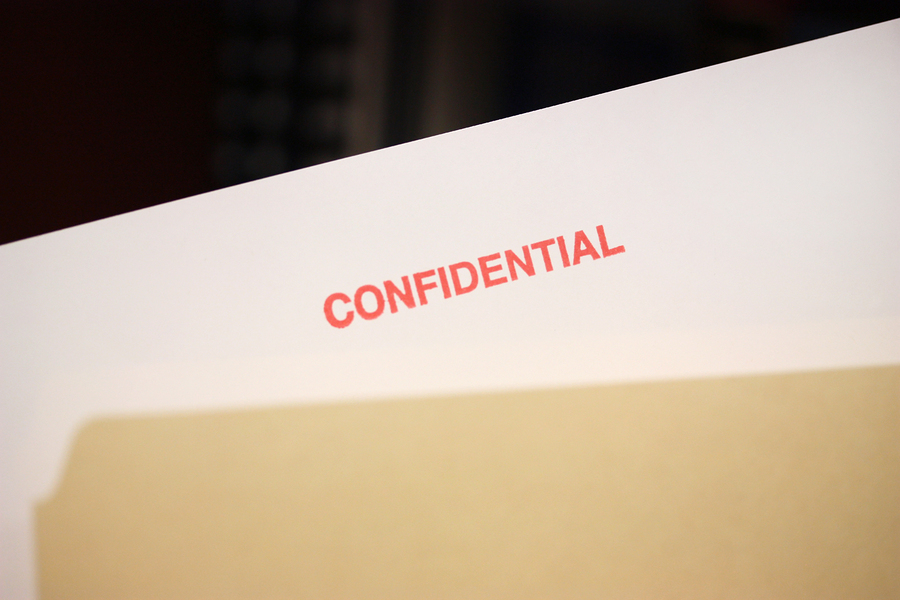
The Confidentiality Myth
When it comes time to sell the company, a seller’s prime concern is one of confidentiality. Owners are afraid that “if the word gets out” they will lose employees, customers and suppliers. Not to downplay confidentiality, but these incidents seldom happen if the process is properly managed. There is always the chance that a “leak” will occur, but when handled correctly, serious damage is unlikely. Nevertheless, a seller should still be very careful about maintaining confidentiality since avoiding problems is always better than dealing with them. Here are some suggestions:
- Understand that there is a “Catch 22” involved. The seller wants the highest price and the best deal, and this usually means contacting numerous potential buyers. Obviously, the more prospective buyers that are contacted, the greater the opportunity for a breach of confidentiality to occur. Business intermediaries understand that buyers have to be contacted, but they also realize the importance of confidentiality and have the procedures in place to reduce the risk of a breach. Another alternative is to work with just a few buyers. This, however, does reduce the chances of obtaining the best price.
- Another way to avoid this breach is to try to keep a short timetable between going to market and a closing. The shorter the timetable, the less the chance for the word to get out. One way to keep a short timetable is to gather all of the information necessary for the buyer’s due diligence ahead of time. Create a place where all of this material can be consolidated. This can be as simple as a set of secured file drawers. Such documentation as: customer and vendor contracts, leases and real estate records, financial statements and supporting schedules (assets, receivables, payables), conditions of employment agreements, organization charts and pay schedules, summary of benefit programs, patents, etc. should be gathered. It is not unusual for due diligence examinations to look back 3 to 5 years, so there could be a lot of records.
- The above means that the seller has to get organized. Selling one’s business is fraught with paperwork. Set up some three-ring binders so all of the relevant paperwork and resulting documentation has a place. These binders should be kept in a secure location.
- The seller’s employees should be conditioned to having strange people (potential buyers) walk through the facility. One way to avoid suspicion is to arrange to have unrelated people, for example – customers, suppliers, advisors – tour the company facilities prior to placing the business on the market.
- If sellers have not prepared their employees for strangers walking through the facilities as suggested above, awkward situations can develop. A valued employee may question why tours are being conducted. The seller is then placed in the position of explaining what is happening or covering the question with a “smokescreen.” A seller could reply by saying that the strangers are possible investors in the company. If asked directly if the business is for sale, the seller could respond by saying that if General Electric wants to pay a bundle for it – anything is for sale. Once in the selling process, it is also important to minimize traffic by only allowing serious, qualified prospects to tour the operation.
- Keep in mind that confidentiality leaks can emanate from many sources. For example, an errant email ends up on someone else’s email. A fax gets sent to the wrong fax machine or UPS or FedEx deliveries go to the wrong people. Establish methods ahead of time on how to communicate with potential buyers or an intermediary.
- The key to handling confidentiality is for the seller to retain a third party intermediary. They will insist that all potential buyers sign a confidentiality agreement. They will also be able to advise the seller on how to handle the “company tours” and can insure that only qualified buyers are shown the facilities.
- The “myth” is that confidentiality issues can make or break a deal, or cause serious damage to the seller’s business. The reality is that breaches seldom occur when an intermediary is involved, and if they do occur and are handled properly, there is little damage to the business or a potential transaction.
Copyright: Business Brokerage Press, Inc.
Read More
A Selling Memorandum
A sellers memorandum includes all those points one would normally expect to see in any business plan, to wit: an executive summary, a business description, financial requirements, target market niche, identification of top management, an operations review, analysis of strengths and weaknesses, and current financial statements and projections.
Guide to Mergers and Acquisitions published by PPC
A proposed sale of a middle-market company almost always begins with a selling memorandum. This document is called many things, including offering memorandum, confidential descriptive memorandum or simply the book. Regardless of what you choose to call it, its purpose is to encourage prospective buyers to take a further look at the company.
For the seller, it has a secondary side benefit. It forces them to take a hard look at the company, its strengths and its weaknesses. Upon reviewing the information necessary to prepare a selling memorandum, the seller may, in fact, decide that it’s not such a bad company after all and elect to keep it. On the other hand, the seller could decide that the current condition of the company needs to be improved before attempting to sell it. Looking at the company through the eyes of a buyer, could also prompt the seller to try to increase the value prior to selling. This may be done, for example, by building a stronger brand loyalty, by entering into employee contracts with key managers, or perhaps by diversifying the customer base.
Assuming, however, that the decision to sell has been made, the importance of the selling memorandum can not be emphasized enough. It is like a strong advertisement for the company and it must tell a good story. It should highlight the positive parts of the company, add value for the buyer, and show the negatives as opportunities. The selling memorandum has to make a good first impression. A seller wants to attract qualified buyers and bring value to the company being sold. This means that the selling memorandum has to be prepared and written by a professional. It is too important a document to do it any other way. It is also the basis of a strong marketing program to attract the best buyer at the best price.
What makes up a strong selling memorandum? It includes quite a few different elements. But, first a few caveats:
- Don’t include confidential company information or reveal trade secrets. Although the document may be intended for qualified buyers only, once it is disseminated it really becomes a public document. Professional intermediaries and investment bankers do make prospective buyers sign a confidentiality agreement, which does help in this area. Still, with copy machines and email services readily available, it never hurts to maintain confidential information until much further in the negotiations.
- Make sure that a prospective buyer knows exactly what you are selling. It is assumed unless otherwise mentioned that it is the entire company that is for sale. You don’t want prospects to think that they can purchase just the most profitable portions of the company. Obviously, a seller wants to show-off the excellent parts of the company, but this should not be done at the expense of the not-so-good parts. These can be presented as excellent opportunities.
- The selling memorandum should not be aimed at the right prospects. If the business requires technical language to best explain it, use it. A buyer, who doesn’t understand it, probably isn’t a buyer.
- There should be an explanation of how the company works so a prospective acquirer can read through the lines about the selling company’s corporate culture. This element can make or break a sale and it’s best to discover it at the outset.
- There is always a tendency to include too much information – don’t. Don’t over-sell. You don’t need to include the names of customers and vendors and the names of all the employees.
- Be sure to also include the blemishes. If there is a pending lawsuit, include. The bad news should be revealed early on – no one likes surprises, especially later in the negotiations.
- And, finally, and probably, most important, the selling memorandum should be easy to read.
Now, what about the various elements of the selling memorandum. Here are the areas that should be covered in it.
Business Profile (or Executive Summary) – This may be the most important element of the selling memorandum. The entire offering should be covered in brief – no more than four-pages, at most. Many are done in one page. Remember, the sole purpose of the business profile is to generate excitement and interest. It is a selling piece! It should include:
- Ownership
- The Business
- Financial highlights
- Products and/or services
- Markets
- The opportunities
- Reason for sale (Why is it for sale?)
This business profile is usually sent to possible purchasers. If the prospect is interested further, they sign a confidentiality agreement before receiving the entire selling memorandum. The selling memorandum includes detailed information on the key elements of the company and usually covers the following:
- Business overview – In other words, who and what is the company? This is the place where everything about the company is summarized: it’s history, the employees (in general), the management team, the locations, any important intangible assets, and the outlook for the business.
- Company strengths – What does the company do well? This should cover those strengths that bring value to this particular company.
- Markets – Who are the customers/clients? What and how does the company sell its products or market its services.
- The Risks – What are they? If there are risks in the business, they should be described and then an explanation of how the company solves them.
- Financial data – Is the company making money? Cash flow statements are important. Current thinking is that the seller doesn’t have to include all of the available financial data – which the prospective buyer will go through all the financial history as the deal moves forward.
The selling memorandum should include any relevant corporate and/or product brochures as attachments. Prior to putting the business on the market, it is important that an outside valuation be performed. However, the price and terms are not usually a part of the selling memorandum – the marketplace will dictate the price. The purpose of the entire selling memorandum is to generate sufficient interest so that a prospective acquirer will make an offer.
Building Value
Prior to putting a company on the market for sale, the question of value has to be addressed. Increasing the value should, in fact, be considered a year, preferably two, prior to sale. Value is based on profitability, cash flow, management and the overall quality of the operation itself. Here are some considerations in building value, whether the business is going to be sold or not.
- Are the company’s pricing policies set too low, creating low margins? Perhaps they were set some time ago in order to boost sales. Now might be a good time to review them to make sure they are in keeping with current market conditions.
- Is the inventory level too high? How about work-in-progress or finished goods? Increasing the turns in inventory can increase cash flow.
- Are you paying too much for raw material? Talk to your vendors and suppliers, you might be able to get some better prices or terms. Take a look at all of the expenses: utilities, telephone, technology, office expenses – it all adds up.
- Are there services that could be outsourced for increased savings?
- Increasing the quality of customer service may entice customers or clients to pay their bill promptly.
- Are all the employees working together to improve the operation and profitability of the company?
These are just a few of the areas that can and should be reviewed. Although profits are important, there is an old expression that cash is king. The time to take a look at the overall company operations is now.
Measuring the Value of a Company
Consider the following important areas of a company. How does your company stack up in these critical areas? If you were to rank them on a 1 to 4 scale, for instance, what would your score be? The higher the score the more valuable the company! They are considered value drivers – in other words, they are important to a prospective buyer.
- Profitability
- Type of business
- History of company and industry
- Business growth
- Customers/Clients
- Market share
- Return on investment
- Quality of financial statements
- Size
- Management
- Terms of sale
For example, in looking at a company’s financial data – are the statements audited or merely compiled? Is the growth of the company slow or is it growing quickly? How about the customer base – is it based on several major ones, or is it spread out over many customers? The time to consider these critical value drivers is now!
Copyright: Business Brokerage Press, Inc.
Read More
Common Seller Questions
How long does it take to sell my business?
It generally takes, on average, between five to eight months to sell most businesses. Keep in mind that an average is just that. Some businesses will take longer to sell, while others will sell in a shorter period of time. The sooner you have all the information needed to begin the marketing process, the shorter the time period should be. It is also important that the business be priced properly right from the start. Some sellers, operating under the premise that they can always come down in price, overprice their business. This theory often backfires, because buyers often will refuse to look at an overpriced business. It has been shown that the amount of the down payment may be the key ingredient to a quick sale. The lower the down payment (generally 40 percent of the asking price or less), the shorter the time to a successful sale. A reasonable down payment also tells a potential buyer that the seller has confidence in the business’s ability to make the payments.
What Happens When There is a Buyer for My Business?
When a buyer is sufficiently interested in your business, he or she will, or should, submit an offer in writing. This offer or proposal may have one or more contingencies. Usually, they concern a detailed review of your financial records and may also include a review of your lease arrangements, franchise agreement (if there is one) or other pertinent details of the business. You may accept the terms of the offer or you may make a counter-proposal. You should understand, however, that if you do not accept the buyer’s proposal, the buyer can withdraw it at any time.
At first review, you may not be pleased with a particular offer; however, it is important to look at it carefully. It may be lacking in some areas, but it might also have some positives to seriously consider. There is an old adage that says, “The first offer is generally the best one the seller will receive.” This does not mean that you should accept the first, or any offer — just that all offers should be looked at carefully.
When you and the buyer are in agreement, both of you should work to satisfy and remove the contingencies in the offer. It is important that you cooperate fully in this process. You don’t want the buyer to think that you are hiding anything. The buyer may, at this point, bring in outside advisors to help them review the information. When all the conditions have been met, final papers will be drawn and signed. Once the closing has been completed, money will be distributed and the new owner will take possession of the business.
What Can I Do To Help Sell My Business?
A buyer will want up-to-date financial information. If you use accountants, you can work with them on making current information available. If you are using an attorney, make sure he or she is familiar with the business closing process and the laws of your particular state. You might also ask if their schedule will allow them to participate in the closing on very short notice. If you and the buyer want to close the sale quickly, usually within a few weeks (unless there is an alcohol license or other license involved that might delay things), you don’t want to wait until the attorney can make the time to prepare the documents or attend the closing. Time is of the essence in any business sale transaction. The failure to close on schedule permits the buyer to reconsider or make changes in the original proposal.
What Can Business Brokers Do – And, What Can’t They Do?
Business brokers are the professionals who will facilitate the successful sale of your business. It is important that you understand just what a professional business broker can do — as well as what they can’t. They can help you decide how to price your business and how to structure the sale so it makes sense for everyone — you and the buyer. They can find the right buyer for your business, work with you and the buyer in negotiating, and work with you both every step of the way until the transaction is successfully closed. They can also help the buyer in all the details of the business buying process.
A business broker is not, however, a magician who can sell an overpriced business. Most businesses are saleable if priced and structured properly. You should understand that only the marketplace can determine what a business will sell for. The amount of the down payment you are willing to accept, along with the terms of the seller financing, can greatly influence not only the ultimate selling price, but also the success of the sale itself.
Copyright: Business Brokerage Press, Inc.
Read More
Are You Ready to Exit?
If you’ve gone this far, then selling your business has aroused enough curiosity that you are taking the first step. You don’t have to make a commitment at this point; you are just getting informed about what is necessary to successfully sell your business. This section should answer a lot of your questions and help you through the maze of the process itself.
Question 1
The first question almost every seller asks is: “What is my business worth?” Quite frankly, if we were selling our business, that is the first thing we would want to know. However, we’re going to put this very important issue off for a bit and cover some of the things you need to know before you get to that point. Before you ask that question, you have to be ready to sell for what the market is willing to pay. If money is the only reason you want to sell, then you’re not really ready to sell.
*Insider Tip:
It doesn’t make any difference what you think your business is worth, or what you want for it. It also doesn’t make any difference what your accountant, banker, attorney, or best friend thinks your business is worth. Only the marketplace can decide what its value is.
Question 2
The second question you have to consider is: Do you really want to sell this business? If you’re really serious and have a solid reason (or reasons) why you want to sell, it will most likely happen. You can increase your chances of selling if you can answer yes to the second question: Do you have reasonable expectations? The yes answer to these two questions means you are serious about selling.
The First Steps
Okay, let’s assume that you have decided to at least take the first few steps to actually sell your business. Before you even think about placing your business for sale, there are some things you should do first.The first thing you have to do is to gather information about the business.
Here’s a checklist of the items you should get together:
- Three years’ profit and loss statements
- Federal Income tax returns for the business
- List of fixtures and equipment
- The lease and lease-related documents
- A list of the loans against the business (amounts and payment schedule)
- Copies of any equipment leases
- A copy of the franchise agreement, if applicable
- An approximate amount of the inventory on hand, if applicable
- The names of any outside advisors
Notes:
If you’re like many small business owners you’ll have to search for some of these items. After you gather all of the above items, you should spend some time updating the information and filling in the blanks. You most likely have forgotten much of this information, so it’s a good idea to really take a hard look at all of this. Have all of the above put in a neat, orderly format as if you were going to present it to a prospective purchaser. Everything starts with this information.
Make sure the financial statements of the business are current and as accurate as you can get them. If you’re halfway through the current year, make sure you have last year’s figures and tax returns, and also year-to-date figures. Make all of your financial statements presentable. It will pay in the long run to get outside professional help, if necessary, to put the statements in order. You want to present the business well “on paper”. As you will see later, pricing a small business usually is based on cash flow. This includes the profit of the business, but also, the owner’s salary and benefits, the depreciation, and other non-cash items. So don’t panic because the bottom line isn’t what you think it should be. By the time all of the appropriate figures are added to the bottom line, the cash flow may look pretty good.
Prospective buyers eventually want to review your financial figures. A Balance Sheet is not normally necessary unless the sale price of your business would be well over the $1 million figure. Buyers want to see income and expenses. They want to know if they can make the payments on the business, and still make a living. Let’s face it, if your business is not making a living wage for someone, it probably can’t be sold. You may be able to find a buyer who is willing to take the risk, or an experienced industry professional who only looks for location, etc., and feels that he or she can increase business.
*Insider Tip
The big question is not really how much your business will sell for, but how much of it can you keep. The Federal Tax Laws do determine how much money you will actually be able to put in the bank. How your business is legally formed can be important in determining your tax status when selling your business. For example: Is your business a corporation, partnership or proprietorship? If you are incorporated, is the business a C corporation or a sub-chapter S corporation? The point of all of this is that before you consider price or even selling your business, it is important that you discuss the tax implications of a sale of your business with a tax advisor. You don’t want to be in the middle of a transaction with a solid buyer and discover that the tax implications of the sale are going to net you much less than you had figured.
Copyright: Business Brokerage Press, Inc.
Read More
10 Tips for a Successful Sale
1.Sellers should find out the loan value of the fixtures, equipment and machinery prior to a sale. Many buyers will count on using it for loan or collateral purposes. No one wants to find out at the last minute that the value of the machinery won’t support the debt needed to put the deal together.
2.Sellers should resolve all litigation and environmental issues before putting the company on the market.
3.Sellers should be flexible about any real estate involved. Most buyers want to invest in the business, and real estate usually doesn’t make money for an operating company.
4.Sellers should be prepared to accept lower valuation multiples for lack of management depth, regional versus national distribution, and a reliance on just a few large customers.
5.If a buyer indicates that he or she will be submitting a Letter of Intent, or even a Term Sheet, the seller should inform them up-front what is to be included:
- price and terms
- what assets and liabilities are to be assumed, if it is to be an asset purchase
- lease or purchase of any real estate involved
- what contracts and warranties are to be assumed
- schedule for due diligence and closing
- what employee contracts and/or severance agreements the buyer will be responsible for
6.Non-negotiable items should be pointed out early in the negotiations.
7.The sale of a company usually involves three inconsistent objectives: speed, confidentiality and value. Sellers should pick the two that are most important to them.
8.A PricewaterhouseCoopers survey of more than 300 privately held U.S. companies that were sold or transferred pointed out the most common things a company can do to improve the prospects of selling:
- improve profitability by cutting costs
- restructure debt
- limit owner’s compensation
- fully fund company pension plan
- seek the advice of a consultant
- improve the management team
- upgrade computer systems
9.Sellers should determine up-front who has the legal authority to sell the business. This decision may lie with the board of directors, a majority stockholder, and a bank with a lien on the business, etc.
10.Partner with professionals. A professional intermediary can be worth his or her weight in gold.
Copyright: Business Brokerage Press, Inc.
Read More